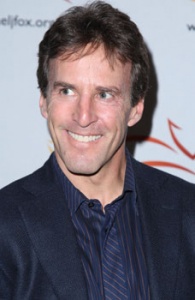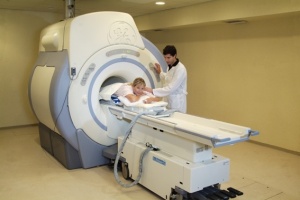October 12th, 2008 by Dr. Val Jones in Celebrity Interviews
No Comments »
 |
|
Davis Phinny
|
Davis Phinney has won more cycling races than any other American. He is charming, articulate, handsome, and requires a deep brain stimulator to keep him from experiencing incapacitating tremors. Davis was diagnosed with Parkinson’s Disease at age 40.
I attended the Parkinson’s Action Network 15th Annual Morris K. Udall Awards Dinner in Washington DC last week. Davis was interviewed by Diane Rehm and I recorded the conversation for my blog readers. It was an exceptional interview.
Davis explained how he was initially diagnosed – he felt tired, slow, experienced foot cramps and began tripping more frequently. As a young, seemingly invincible athlete who worked long hours, he assumed that he was just tired and in need of a massage. Eventually his symptoms became so persistent that he went to see a physician. After many tests and many different doctors examined him, a retired neurologist made the diagnosis. Davis says that it was a tough blow to his family. He felt as if he were Superman, now saddled with a permanent kryptonite necklace. Read more »
October 11th, 2008 by Dr. Val Jones in Expert Interviews
No Comments »

Photo Credit: FUS Foundation
Did you know that one in three women will have a hysterectomy (surgical removal of the uterus) by age 60? It is the second most common surgical procedure among women in the United States. But the question is: are they all necessary? I had a fascinating interview with Dr. Elizabeth Stewart from the Mayo Clinic about some of the reasons behind the potential excess of this type of surgery. You may be surprised to learn that insurance reimbursement guidelines may have something to do with it.
Dr. Val: Women often undergo hysterectomies to treat painful fibroids (benign growths in the uterus). What do women need to know about their fibroid treatment options?
Dr. Stewart: They need to know that they have many different treatment options for uterine fibroids. A hysterectomy is not their only choice. Women should ask their doctor to explain all their options and also make sure that they have the correct diagnosis – menstrual cramping and heavy bleeding doesn’t necessarily mean you have fibroids.
Nowadays we can treat fibroids with hysterectomy, uterine artery ablation, or MRI-guided focused ultrasound surgery (MRgFUS). MRgFUS is a nearly painless procedure where we use focused ultrasound waves to destroy fibroid tissue via heat transfer. I know one woman who went back to work 2 hours after the procedure. Recovery from a hysterectomy or uterine artery ablation can take weeks to months.
Dr. Val: What are some of the advantages and disadvantages of treating fibroids with focused ultrasound? Read more »
October 9th, 2008 by Dr. Val Jones in Announcements
15 Comments »
 |
|
Dr Val
|
Thanks for visiting my new website, everyone! I’m really glad you’re here… Please take the time to vote in my polls so I can learn a little bit more about who you are. To be honest, I’ve never really known WHO my audience was at my former blog at Revolution Health. I just kept chirping away, with the occasional comment/feedback. Now that I have my own site I’ll be interested in getting to know you better, just as some of you have gotten to know me over the past few years.
So what is this website about, anyway? Well, it’s my hope that the site will provide you with a few things:
1. Straight talk about a wide variety of health topics
2. Entertaining and educational interviews with experts, celebrities, and patients
3. Laughter therapy via cartoons and humorous writing
4. A trusted source of health information for yourself and your family
5. Access to the very best health bloggers via a weekly digest called Grand Rounds
I am committed to integrity, transparency, and scientific accuracy. I will give 10% of any advertising revenues directly to charity, and I will always let you know exactly how the site is monetized and disclose any potential personal conflicts of interest or biases.
My ultimate goal is to help people “get better health.” Whether that means modifying our behaviors, taking better care of our chronic illnesses, or living life to the fullest despite a limitation or disability. This is a website for men and women, for healthcare professionals and patients, for moms and dads, for baby boomers and generation X-ers. Everyone is welcome, and I hope you’ll come back regularly for a dose of positive reinforcement as we all work together on getting better health.
***
Many thanks to those of you who hosted me while I was “homeless.”
October 9th, 2008 by Dr. Val Jones in Expert Interviews
4 Comments »

I’ll admit it – when I was a kid, I admired Dr. Bones (McCoy) of Star Trek. He was a no-nonsense kind of guy who was very clear about his areas of expertise (“Damn it, Jim, I’m a doctor, not a spaceship engineer.”) But best of all, Dr. McCoy had special healing gadgets that he could wave over people for diagnostic and therapeutic purposes. Those “tricorders” fascinated me – and I always wished I could have one myself.
And now my dream could actually come true: advances in focused ultrasound technology (FUS) make non-invasive surgical procedures possible. I attended the very first international symposium about this new technology, and learned some very exciting things.
First of all, Dr. Ferenc Jolesz gave a riveting key note address about the history of focused ultrasound technology, and why modern advances have made this treatment modality feasible. Scientists have been fantasizing about heating tissues with sound waves since 1942 when the first ultrasound experiment was conducted on a liver tumor. Unfortunately back then, imaging studies (beyond X-rays) had not yet been developed – so it was virtually impossible to “see” one’s target.
However, now that magnetic resonance imaging (MRI) machines are capable of displaying our innards in exquisite detail Read more »
October 7th, 2008 by Dr. Val Jones in Expert Interviews, Medblogger Shout Outs
No Comments »
Many thanks to my fellow blogger KevinMD who offered to host me during my period of blog homelessness. In this post, I interview Dr. Ken Thorpe about the real driver of healthcare costs:
About 75% of what we spend on healthcare is associated with chronically ill patients. That’s about 1.6 trillion dollars per year. Chronic disease accounts for the biggest source of spending in the healthcare economy, and it’s also the fastest growing – as more and more people are living with chronic illnesses. If we’re really serious about getting to the bottom of the healthcare affordability crisis, we’ll have to first address the chronic disease issue…
For the rest of the post, please click here.














